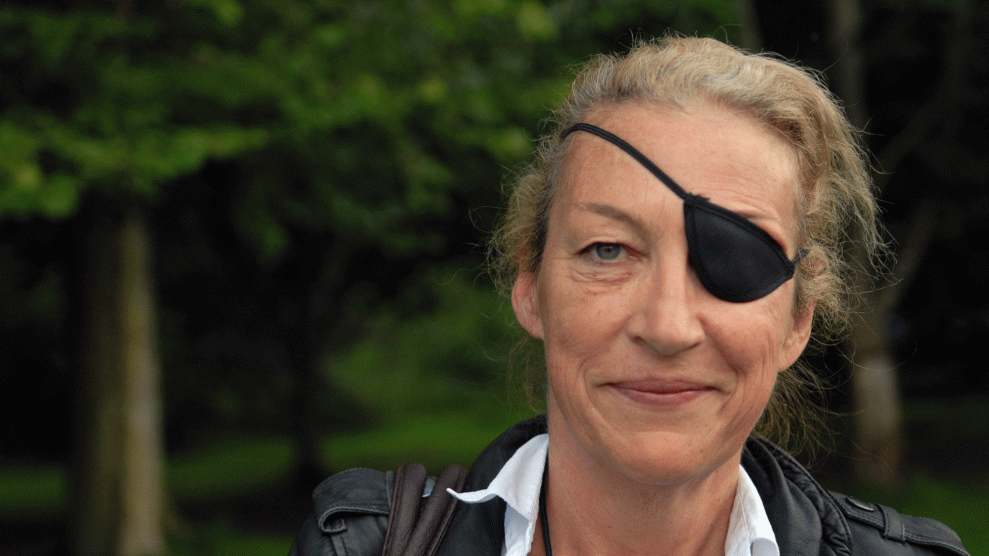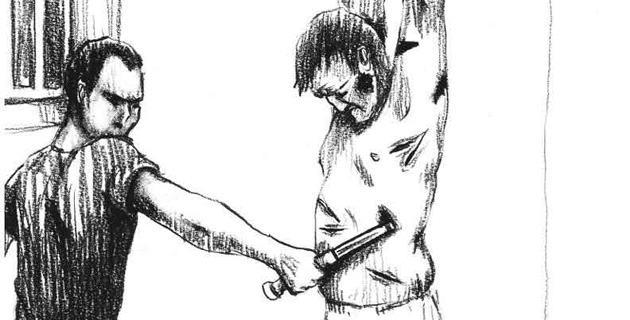
Marie Colvin, the American-born, London-based war correspondent in 2011Writer Pictures/AP
As the Syrian government launched a scorched-earth siege of Homs in early 2012, the American war reporter Marie Colvin holed up in a clandestine media center inside the city, sending out live broadcasts on the attack’s heavy civilian casualties. “There are rockets, shells, tank shells, anti-aircraft being fired in parallel lines into the city,” she said in an interview with CNN’s Anderson Cooper in the pre-dawn hours of February 22, 2012. “It’s a complete and utter lie they’re only going after terrorists. The Syrian Army is simply shelling a city of cold, starving civilians.”
It was Colvin’s last call to CNN. Later that morning, the Syrian military fired directly at the makeshift media center. Using a targeting method called “bracketing,” rockets and mortars landed on each side of the center, the rounds inching closer until eventually, a rocket struck outside the front door as Colvin and her colleagues attempted to evacuate. Colvin and French photographer Rémi Ochlik were killed immediately, and shrapnel and debris severely injured the French reporter Edith Bouvier and Colvin’s colleagues, Paul Conroy and Wael al-Omar.
At the time, the Syrian Information Ministry said that the government was unaware that Colvin and Ochlik were in the country. However, a federal lawsuit filed over the weekend on behalf of Colvin’s family alleges that the Syrian government targeted the media center “with premeditation” to silence Colvin and other media critics of the regime of Bashar al-Assad. The civil complaint claims that Colvin was deliberately assassinated by high-ranking officials within the Assad government. “Marie Colvin was killed for exposing the Assad regime’s slaughter of innocent civilians to the world,” said attorney Scott Gilmore of the Center for Justice and Accountability, which is representing her family, in a statement. “The regime wanted to wage a war without witness against the democratic opposition. To do that, they needed to neutralize the media.”
The case, which is the result of a three-year investigation that draws on captured government documents and statements from defectors, seeks unspecified financial damages from the Syrian government. The suit alleges that Syrian intelligence officers got a tip that foreign reporters were staying at the media center in Homs and tried intercept Colvin’s broadcast satellite signal. After pinpointing her location, Syrian forces shelled her position with artillery strikes, the complaint states.
Colvin, who was 56 at the time of her death, had a reputation for courageousness while covering some the world’s most violent conflicts over the two decades that she reported for the London-based Sunday Times. She wore an eye patch after suffering an injury in an explosion while covering Sri Lanka’s civil war in 2001.
Her family’s suit is the first case yet that aims to hold the Assad regime responsible for war crimes. It was filed under the Foreign Sovereign Immunities Act, a relatively obscure federal law that allows Americans to sue nations that are designated as sponsors of terrorism. “It’s very hard to hold a foreign state accountable for war crimes,” says Dixon Osburn, the executive director of the Center for Justice and Accountability. But with the Colvin case, says Osburn, “we had the jurisdictional perfect storm of being able to have the plaintiff and defendant that both fit the statute.”
Previously, FSIA has been invoked against the Vatican in cases involving clergy sexual abuse. It also protected Saudi Arabia when families and victims of the 9/11 attacks filed a lawsuit alleging that Saudi leaders had financed Al Qaeda. In 1980, plaintiffs used FSIA to successfully sue the government of Chile for the assassination of its former ambassador to the United States, and in 1992, the act was cited in a torture suit against Argentina.
“The Colvin family recognizes that they’re in a unique position to bring this lawsuit, and there are so many others who have lost sons and daughters who don’t have the same kind of opportunity,” says Osburn. “The hope is to provide some voice about what’s happening in Syria, about what happened at the siege of Homs, and to shed light on the atrocities that have been committed.”














